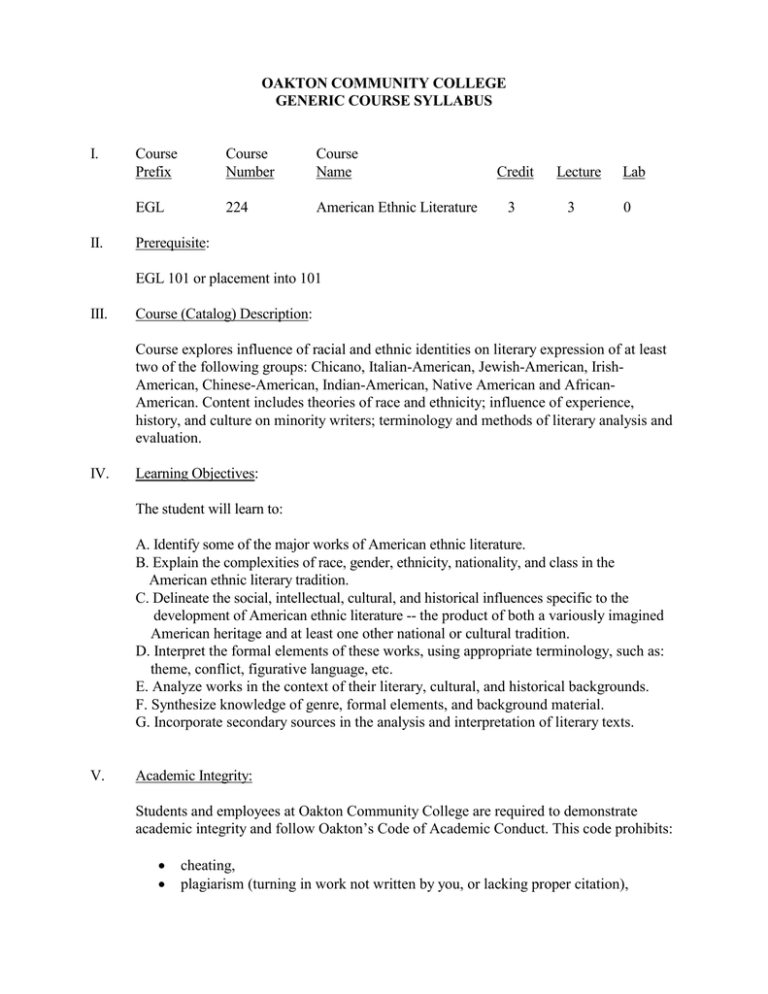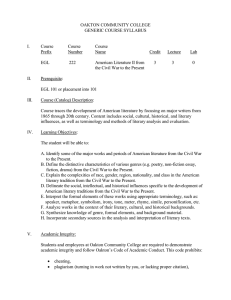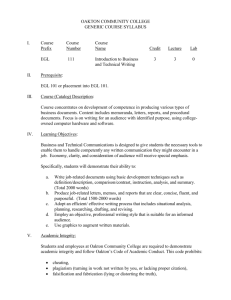OAKTON COMMUNITY COLLEGE GENERIC COURSE SYLLABUS I.
advertisement

OAKTON COMMUNITY COLLEGE GENERIC COURSE SYLLABUS I. II. Course Prefix Course Number Course Name EGL 224 American Ethnic Literature Credit 3 Lecture 3 Lab 0 Prerequisite: EGL 101 or placement into 101 III. Course (Catalog) Description: Course explores influence of racial and ethnic identities on literary expression of at least two of the following groups: Chicano, Italian-American, Jewish-American, IrishAmerican, Chinese-American, Indian-American, Native American and AfricanAmerican. Content includes theories of race and ethnicity; influence of experience, history, and culture on minority writers; terminology and methods of literary analysis and evaluation. IV. Learning Objectives: The student will learn to: A. Identify some of the major works of American ethnic literature. B. Explain the complexities of race, gender, ethnicity, nationality, and class in the American ethnic literary tradition. C. Delineate the social, intellectual, cultural, and historical influences specific to the development of American ethnic literature -- the product of both a variously imagined American heritage and at least one other national or cultural tradition. D. Interpret the formal elements of these works, using appropriate terminology, such as: theme, conflict, figurative language, etc. E. Analyze works in the context of their literary, cultural, and historical backgrounds. F. Synthesize knowledge of genre, formal elements, and background material. G. Incorporate secondary sources in the analysis and interpretation of literary texts. V. Academic Integrity: Students and employees at Oakton Community College are required to demonstrate academic integrity and follow Oakton’s Code of Academic Conduct. This code prohibits: cheating, plagiarism (turning in work not written by you, or lacking proper citation), GENERIC COURSE SYLLABUS EGL 224 Page 2 falsification and fabrication (lying or distorting the truth), helping others to cheat, unauthorized changes on official documents, pretending to be someone else or having someone else pretend to be you, making or accepting bribes, special favors, or threats, and any other behavior that violates academic integrity. There are serious consequences to violations of the academic integrity policy. Oakton’s policies and procedures provide students a fair hearing if a complaint is made against you. If you are found to have violated the policy, the minimum penalty is failure on the assignment and, a disciplinary record will be established and kept on file in the office of the Vice President for Student Affairs for a period of 3 years. Details of the Code of Academic Conduct can be found in the Student Handbook. VI. Sequence of Topics: A. Review of principles of the study of literature B. Overview of American ethnic literature 1. Definition and discussion of hybridity 2. Discussion of the production and distribution of American ethnic literature 3. Review of traditional literary studies approaches to the teaching of American literature C. Sequence of units on the literature of particular ethnic literatures (selected at instructor’s discretion.) (What follows is one example) 1. The Colonial Experience – selections from Mary Rowlandson and Hector St. John DeCrevecouer 2. Jewish-American literature – readings from Abraham Cahan, Anzia Yezierska, Philip Roth, and Allegra Goodman 3. Irish-American literature – illustrations from Thomas Nast, readings from Finley Peter Dunne, James Farrell, Eugene O’Neill, and Frank McCourt 4. Chicano literature – readings from Oscar Hijuelos, Sandra Cisneros, and Ana Castillo D:\219547334.doc GENERIC COURSE SYLLABUS EGL 224 Page 3 5. Chinese-American literature – historical reports on “Tong wars” and Chinese exclusionary acts of late 19th century, readings from Frank Chin, Maxine Hong Kingston, and Chang-Rae Lee 6. Indian-American literature – readings from Bharati Mukherjee and Anjana Appachana VII. Methods of Instruction: Course may be taught as a face-to-face, media-based, hybrid, or online course. Lecture, discussion, and writing. Instructors may also invite speakers to discuss their personal experience within particular minority cultures and organize field trips to ethnic neighborhoods and landmarks in the greater Chicago area. VIII. Course Practices Required: Reading, writing, and testing; possibly oral presentations. Instructors might consider requiring students to keep a reading journal in which they reflect on the many different kinds of literature they encounter. IX. Instructional Materials: Note: Current textbook information for each course and section is available on Oakton’s Schedule of Classes. Instructors will choose a number of anthologies of particular ethnic literatures (such as Charlie Chan Is Dead: An Anthology of Contemporary Asian American Fiction by Jessica Hagedorn or American-Jewish Fiction by Gerald Shapiro), should assign appropriate novels in their entirety (such as The House on Mango Street by Sandra Cisneros or The Woman Warrior by Maxine Hong Kingston), and should assign additional coursepack readings, as well. X. Methods of Evaluating Student Progress: A minimum of three analytical essays to total a minimum of twenty pages. A mid-term and final exam. Instructors may consider requiring their students to write a broader essay reflecting on some aspects of the ethnic experience in America. D:\219547334.doc GENERIC COURSE SYLLABUS EGL 224 XI. Page 4 Other Course Information: + Attendance policy + If you have a documented learning, psychological, or physical disability you may be entitled to reasonable academic accommodations or services. To request accommodations or services, contact the Access and Disability Resource Center at the Des Plaines or Skokie campus. All students are expected to fulfill essential course requirements. The College will not waive any essential skill or requirement of a course or degree program. Effective beginning term: Fall 2013 Ending term: Syllabus prepared by: Date: Revised by: Literature &Creative Writing Committee Date: November 2009 ___________ Reviewed by Chair: Lynn Woodbury Date: March 2010 Approval by Dean: Linda A. Korbel Date: June 2013 D:\219547334.doc



